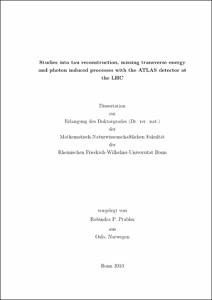Prabhu, Robindra P.: Studies into tau reconstruction, missing transverse energy and photon induced processes with the ATLAS detector at the LHC. - Bonn, 2011. - Dissertation, Rheinische Friedrich-Wilhelms-Universität Bonn.
Online-Ausgabe in bonndoc: https://nbn-resolving.org/urn:nbn:de:hbz:5N-26499
Online-Ausgabe in bonndoc: https://nbn-resolving.org/urn:nbn:de:hbz:5N-26499
@phdthesis{handle:20.500.11811/5041,
urn: https://nbn-resolving.org/urn:nbn:de:hbz:5N-26499,
author = {{Robindra P. Prabhu}},
title = {Studies into tau reconstruction, missing transverse energy and photon induced processes with the ATLAS detector at the LHC},
school = {Rheinische Friedrich-Wilhelms-Universität Bonn},
year = 2011,
month = oct,
note = {The ATLAS experiment is currently recording data from proton-proton collisions delivered by CERN's Large Hadron Collider. As more data is amassed, studies of both Standard Model processes and searches for new physics beyond will intensify. This dissertation presents a three-part study providing new methods to help facilitate these efforts.
The first part presents a novel &tau-reconstruction algorithm for ATLAS inspired by the ideas of particle flow calorimetry. The algorithm is distinguished from traditional &tau-reconstruction approaches in ATLAS, insofar that it seeks to recognize decay topologies consistent with a (hadronically) decaying &tau-lepton using resolved energy flow objects in the calorimeters. This procedure allows for an early classification of &tau-candidates according to their decay mode and the use of decay mode specific discrimination against fakes. A detailed discussion of the algorithm is provided along with early performance results derived from simulated data. The second part presents a Monte Carlo simulation tool which by way of a pseudorapidity-dependent parametrization of the jet energy resolution, provides a probabilistic estimate for the magnitude of instrumental contributions to missing transverse energy arising from jet fluctuations. The principles of the method are outlined and it is shown how the method can be used to populate tails of simulated missing transverse energy distributions suffering from low statistics. The third part explores the prospect of detecting photon-induced leptonic final states in early data. Such processes are distinguished from the more copious hadronic interactions at the LHC by cleaner final states void of hadronic debris, however the soft character of the final state leptons poses challenges to both trigger and offline selections. New trigger items enabling the online selection of such final states are presented, along with a study into the feasibility of detecting the two-photon exchange process pp(γγ→τ τ)p*p* with early data.},
url = {https://hdl.handle.net/20.500.11811/5041}
}
urn: https://nbn-resolving.org/urn:nbn:de:hbz:5N-26499,
author = {{Robindra P. Prabhu}},
title = {Studies into tau reconstruction, missing transverse energy and photon induced processes with the ATLAS detector at the LHC},
school = {Rheinische Friedrich-Wilhelms-Universität Bonn},
year = 2011,
month = oct,
note = {The ATLAS experiment is currently recording data from proton-proton collisions delivered by CERN's Large Hadron Collider. As more data is amassed, studies of both Standard Model processes and searches for new physics beyond will intensify. This dissertation presents a three-part study providing new methods to help facilitate these efforts.
The first part presents a novel &tau-reconstruction algorithm for ATLAS inspired by the ideas of particle flow calorimetry. The algorithm is distinguished from traditional &tau-reconstruction approaches in ATLAS, insofar that it seeks to recognize decay topologies consistent with a (hadronically) decaying &tau-lepton using resolved energy flow objects in the calorimeters. This procedure allows for an early classification of &tau-candidates according to their decay mode and the use of decay mode specific discrimination against fakes. A detailed discussion of the algorithm is provided along with early performance results derived from simulated data. The second part presents a Monte Carlo simulation tool which by way of a pseudorapidity-dependent parametrization of the jet energy resolution, provides a probabilistic estimate for the magnitude of instrumental contributions to missing transverse energy arising from jet fluctuations. The principles of the method are outlined and it is shown how the method can be used to populate tails of simulated missing transverse energy distributions suffering from low statistics. The third part explores the prospect of detecting photon-induced leptonic final states in early data. Such processes are distinguished from the more copious hadronic interactions at the LHC by cleaner final states void of hadronic debris, however the soft character of the final state leptons poses challenges to both trigger and offline selections. New trigger items enabling the online selection of such final states are presented, along with a study into the feasibility of detecting the two-photon exchange process pp(γγ→τ τ)p*p* with early data.},
url = {https://hdl.handle.net/20.500.11811/5041}
}






